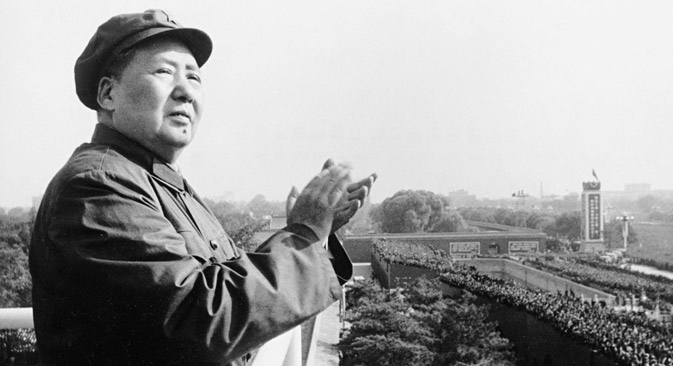
Mao Zedong. Source: Alamy/Legion Media
Back in the late 1960s, Mao Zedong was quite popular among Western progressive intellectuals like Jean Paul Sartre, who started putting the Chinese leader on the pedestal where he once placed Joseph Stalin. The Cultural Revolution was then seen as a bold social experiment to be studied, and perhaps even emulated in Paris and Bonn.
Things in Moscow were different, very different indeed. Mao and his social model found virtually no admirers in the Soviet Union of the 1960s and 1970s. Across the then Soviet political spectrum, Chairman Mao was arguably the most despised foreign politician. When Russian intellectuals learnt about the Mao craze of their Western peers they were really surprised and perplexed. For them, China of the 1960s was a nightmare of the first order.
Relations between the USSR and China went sour in the late 1950s, and by 1963-64 their mutual hostility was clear for all to see. In its heated quarrel with Maoist China, the Soviet Government enjoyed near universal support from below. For the majority of Soviet people in the 1960s, Mao’s China (as well as Kim Il Sung’s North Korea) stood for everything that was wrong in the Soviet system itself.
Liberal-orientated communists (yet to become a rare species in the Soviet intelligentsia) saw in Mao’s regime the embodiment of the worst excesses of Stalinism. Nationalist communists, as well as Russian nationalists in general, saw him as a dangerous and ungrateful ally who dared to bite the feeding hand of Mother Russia.
Maoist propaganda, which occasionally reached the Soviet audience, was usually ridiculed and further reinforced a highly negative image of Mao’s China (this was also very much the case with North Korean propaganda of the same period).
However, with Chinese attacks on Damansky/Zhenbao in 1969, ridicule and contempt were partially replaced with fear. Though China was militarily inferior, in the popular imagination it came to be seen as a serious military threat, equal if not superior to that of the United States and its allies.
In some cases such fears were clearly mixed with the memory of the 'Yellow peril scare', the (rather ridiculous) fear of an eventual Asian invasion, which engulfed some sections of the European society before World War I. At the same time, the Damansky/Zhenbao incident became an important part of the Soviet military myth.
Up until now, generations of Soviet/Russian soldiers have been told about the heroic exploits of the Russian warriors who repelled Chinese aggression back in 1969.
From the mid-1960s, the Soviet media probably devoted more space to critical attacks on China than to similar harangues against the United States and other “reactionary imperialist regimes.” Unlike attacks on the latter, which by the 1960s were increasingly taken with a grain of salt, the anti-Chinese and anti-Maoist diatribes were taken seriously, even though such attacks were delivered in the official ideological discourse.
At the same time, Soviet propagandists, following the old Marxist approach, usually made a clear distinction between the “aggressive and hegemonic” Mao cliché and the common people who were merely “misled and exploited by the ruling group of pseudo-communist deviationists.”
In the Soviet media, China was never deprived of its honorary title of a socialist country. It was merely presented as a socialist country that had gone astray due to the policies of its unscrupulous leadership. Tellingly, the Soviet media always hinted that the path to reconciliation remained open.
It is remarkable that throughout the entire period of the Sino-Soviet schism only a small number of works of Soviet literary fiction and only one feature film dealt with the topic of Maoist China as a potential security threat to the Soviet Union. This can be contrasted with a large number of similar works of art, dealing with the security challenges emanating from the United States.
So, when Deng Xiaoping’s government in China began to tone down the rhetoric, such efforts were immediately reciprocated by the Soviet government. From around 1985 Sino-Soviet relations began to improve fast.
Admittedly, by that time, Maoism had gone out of fashion in China itself, and the Russian public had little problem with the emerging China of Comrade Deng. The 25 years of mutual and quite sincere hostility came to an abrupt end.
This article was first published by RBTH Asia
All rights reserved by Rossiyskaya Gazeta.
Subscribe
to our newsletter!
Get the week's best stories straight to your inbox